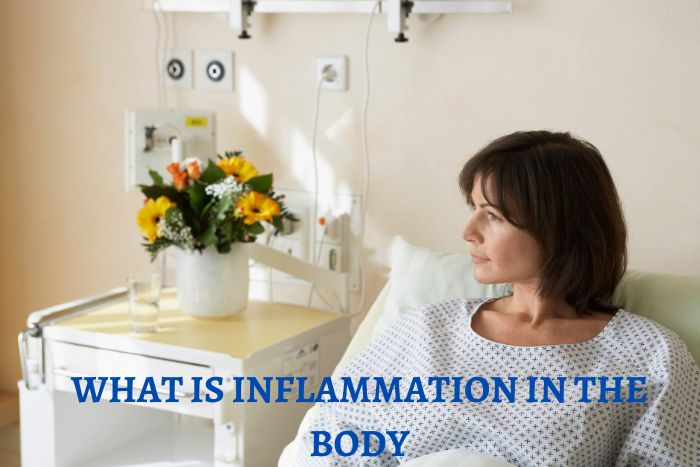
What is inflammation in the body? Inflammation is a common root of many chronic diseases. Oxidative stress influences the beginnings of inflammation.
Types of inflammation
Types of inflammation are:
- Normal inflammation
- Abnormal inflammation
Normal inflammation
Healthy inflammation occurs when the body’s healing system reacts to a localized attack or injury. The process happens in one area. It starts here, is maintained, and is finished with healing here.
Inflammation could happen when a sudden injury to the skin from impact or burn affects a particular area.
Some changes occur together one by one. The heat and redness show the influx of blood to the affected area. The swelling happens because small blood vessels allow plasma to go to tissues. The pain follows. The immune system participates in the healing process. It takes time, but the inflammation disappears when the problem resolves. We can be disappointed when we have pain and redness or swelling. Fortunately, it takes a short time and a restricted area of inflammation.
Abnormal inflammation
Abnormal inflammation differs in space and time. When healthy inflammation starts in one place and ends simultaneously, abnormal inflammation can attack the whole body.
What is worst is that inflammation lets the immune system attack all cells. These powerful immune killer cells go after affected cells and healthy ones.
How do they work these killer cells?

The immune system has the best army in the world. Immune cells have different tasks in the body and act according to the situation. Some enzymes could destroy cell walls and digest the vital components of cells and tissues.
Usually, when healthy inflammation occurs, the body is able to control the process. It deals with the consequences of impact or invasion in one place. When healing ends, the body stops control over the inflammation process because there is no need to take care of it.
What is wrong with abnormal inflammation?
The body does not control the abnormal inflammation. It spreads over all tissues and does not quit easily. The immune system participates in healing. Unfortunately, it could lead to autoimmune disorders when it does not get the command from the body on what to target and when to stop.
What does it mean?
Autoimmune disorders occur when the immune system attacks cells without a difference. Sick or healthy cells suffer from powerful killer cells. It can lead to:
- Discomfort
- Disability
- Failure of organs
- Irreparable damage to essential structures
For example, type I diabetes is autoimmune from the start:
- The immune system starts an abnormal attack triggered by an unknown cause
- The beginning is early in life
- Insulin-producing cells in the pancreas destroyed
Rheumatic fever, rheumatoid arthritis, and systemic lupus erythematosus are autoimmune disorders.
What does trigger autoimmune reactions?
There are some origins, such as:
- Infection
- Toxic injury
- Stress
- Environmental issues such as air, water, and food pollution
New findings are causes of disorders
Dr. Andrew Weil states that doctors have a consensus about the triggers of some diseases. Asthma, atherosclerosis, Alzheimer’s, ALS, and Parkinson’s disease have components of abnormal inflammation.
Irritable bowel syndrome(IBS) can start from microinflammation. It can be seen just with a microscope examining damage to the GI tract tissue.
Previously, other triggers were to blame. For example, cholesterol was responsible for atherosclerosis. Now doctors think that the damage was done at first by inflammation. Later on, cholesterol deposits can be a response to protect damaged areas covering defects.
First, abnormal inflammation occurs. Second, the body attempts to heal affected areas.
Regulation of inflammatory process
Before digging into this inflammation topic, I thought hormones are primarily for growth and fertility. Nope. Hormones take a respectable place in our body’s metabolism.
What do the control mechanisms of inflammation?
Prostaglandins and leukotrienes were responsible for the control of the inflammation process. Hormones work synergetically. Imagine a swinging pendulum. When you do not move it, the swing stays in one place. The balance was achieved. Hormones work in the same way in the body. They interact and make sure that processes would not go wild.

Some of the hormones increase inflammatory activity; some of them dampen it. These hormones must be in equilibrium.
Interestingly, the same hormones which increase inflammation can trigger cells to proliferate. Other hormones that decrease inflammation can cease the abnormal division of cells.
What Does It Mean?
What does it mean?
It means that disrupted balance in hormonal activity can trigger inflammation and lead to nasty diseases.
Is there an escape from this misery?
Yes, it is. Education is the first thing that would help us make the right choices. Second, a fit lifestyle is a way to avoid significant problems and consequences from it.
Do you see a connection here?
According to Dr. Andrew Weil:
food choices we make can determine whether we are in a pro-inflammatory state or an anti-inflammatory one.
Hormones are prostaglandins and leukotrienes synthesized in the body. The body uses polyunsaturated fatty acids (PUFAs), essential nutrients. We do not make these vital nutrients. We must get them from food.
There are two types of PUFAs:
- Omega-3 fatty acids
- Omega-6 fatty acids
The demand for these fatty acids is a constant and vital one.
Hormones made from omega-6 acids intensify inflammation, and hormones produced from omega-3 fatty acids downregulate it.
Sources of fatty acids
Omega-6 fatty acids come from the fat of grass-fed animals, oil-rich seeds, and vegetable oils extracted from them.

Omega-3 fatty acids are found in :
- Leafy greens
- Walnuts
- Flax seeds
- Hemp
- Soy oils
- Canola oils
- Sea vegetables
- Salmon
- Sardines
- Herring
- Mackerel
- Black Cod
- Bluefish
- Fat from grass-fed animals
Nutritionists think that the balance between the consumption of omega-6 and omega-3 was stable in the past. When processed food takes over, especially in Western countries, this balance is disrupted.
You know about the fattening of animals and birds with hormones and antibiotics, keeping them in confined places. Vegetable oils heated. Snack foods provide omega-6 fatty acids. There is no place for omega-3. So what, you would ask?
Omega-3 fatty acids dampen inflammation. Period. If you do not get enough of these acids, your body cannot produce the right hormones that regulate inflammation. Do you see how it goes? It is a chain reaction. One thing leads to another.
Processed food disrupts the balance of hormones. It leads to inflammation. Inflammation is the root of diseases. No fun? Yes, I agree.
Again, there are words from Dr.Andrew Weil:
In a nutshell: you can reduce the risks of abnormal inflammation and diseases associated with it and shift your body from a pro-inflammatory to an anti-inflammatory state by increasing your intake of omega-3 fatty acids, decreasing your intake of omega-6 fatty acids, and excluding from your diet the kinds of fat known to promote inflammation.
Are fats only to blame for inflammation?
I am sorry, but carbohydrates are responsible for inflammation too.
The chemical reaction’s name is glycation when proteins and sugar react. Glycation produces pro-inflammatory compounds. They are called advanced glycation end products (AGEs).
For me, it correlates with aging. AGEs promote inflammation through the deformation of proteins, cross-linking them.
The glycation could be measured. Doctors check blood levels looking for hemoglobin AIC. It is a form of glycated hemoglobin.
Knowing the numbers of glycation is essential. This process affects proteins and generates AGEs.
Do We Need To Be Afraid Of Glycation?
Typically people have low levels because the body’s defense mechanisms protect us.
How to choose wisely carbohydrate sources?
Learn about the glycemic index and glycemic load
- Eat foods with a low glycemic index and glycemic load. Change snack foods with whole grains, beans, sweet potatoes, and other vegetables. Eat more temperate fruits compared with tropical fruits such as pineapple, mango, or papaya.
- Consume less processed food
- Avoid fast food
- Eat fewer products made with flour of any kind
- Skip products made with high-fructose syrup.
Conclusion
Healthy inflammation benefits the body. At the time of impact, the body pulls all helpers and starts to take care of the confined area at a particular time. When the consequences of injury or invasion are removed, inflammation disappears.
Abnormal inflammation occurs when the body can not control the immune system, and defense mechanisms start to attack its cells.
The quality and origin of diet have a strong influence on inflammation evolution. Watching the menu and changing lifestyles could enormously impact the quality of our lives.
If you have questions or would like to leave a comment, I would be glad to answer it.